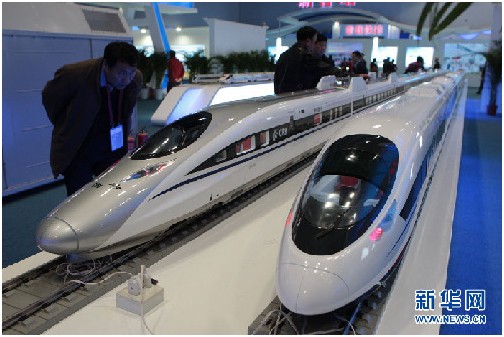


File Photo
LUANG PRABANG, Laos, Dec. 25 -- Construction of the China-Laos railway officially started Sunday in northern Lao city Luang Prabang.
Addressing the ceremony, Lao Minister of Public Works and Transport Bounchanh Sinthavong said the development of the railway is of great significance in implementing the resolution of the 10th National Congress of the Lao People's Revolutionary Party (LPRP) and in boosting Lao socio-economy.
The project will help expand and promote Laos-China cooperation in economy, trade, investment and tourism among others, as well as further strengthen economic ties in China-ASEANfree trade area, said the minister.
"Once completed, the railway will benefit Lao people of all ethnic groups, facilitate and reduce costs of transportation, stimulate the development of agricultural and industrial sectors, tourism, investment and trade, as well as generate income for Lao people and the country," he added.
Bounchanh, on behalf of the ministry and the project management committee, expressed the gratitude to China for supports.
Infrastructure construction is the foundation for economic development. China-Laos railway project is a historic milestone in the comprehensive strategic cooperation between Laos and China.
Huang Difu, general manager of China Railway International Co., Ltd and chairman of Laos-China Railway Company, said the China-Laos railway is a major strategic project.
After the ground-breaking ceremony on Dec. 2, 2015, governments and businesses of China and Laos have closely coordinated to complete the formation of Laos-China Railway Company and sign agreements on concession period of the railway.
Meanwhile, work on preliminary design, project bidding, imports of material and equipment, land clearance among other preparations have gained initial results, said Huang.
"Following the consensus reached by leaders of the two countries as well as the preparatory situation of the project, it is now the time to officially begin construction of the railway," Huang added.
China-Laos railway is an important part of the pan-Asia railway network and a major route linking China and Laos.
The China Railway Corporation will take the best of its advantages on railway management, technology and resources to lead other enterprises on survey and design, construction and equipment manufacturing among others, as well as cooperate with the Lao government and relevant enterprises in a bid to construct and operate China-Laos railway in a good manner, Huang said.
On behalf of Laos-China Railway Company, Huang pledged to resolutely implement the consensus reached by the two governments on railway construction and operation.
On the basis of initial results, the company will continue to strengthen communication and collaboration with the Lao government at all levels, support each other, follow the plan and requirements so as to ensure high standards of quality and schedule, contributing to promoting socio-economic development of the two countries and prosperity of the two peoples.
The launching ceremony of China-Laos railway construction on Sunday also saw the attendance of Lao Prime Minister Thongloun Sisoulith, former Deputy Prime Minister of Somsavat Lengsavad, Chinese Ambassador to Laos Guan Huabing, representatives of Lao ministries as well as representatives of cities and provinces along the railway.
Thongloun also shovelled the earth and struck a gong for the official launch of China-Laos railway construction.
The China-Laos railway has a total length of 414.332 km with over 62.7 percent of bridges and tunnels, linking Mohan-Boten border gate in northern Laos and capital Vientiane.
There are 32 stations along the route. Operating speed on the route is designed at 160 km per hour. Construction of the project is scheduled for five years with investment of some 40 billion Chinese yuan (5.76 billion U.S. dollars), 70 percent of which comes from Chinese investment and the rest 30 percent from Laos.
China-Laos railway is the first overseas route connecting with the railway system in China, using Chinese technology, equipment and investment.
 Fire brigade in Shanghai holds group wedding
Fire brigade in Shanghai holds group wedding Tourists enjoy ice sculptures in Datan Town, north China
Tourists enjoy ice sculptures in Datan Town, north China Sunset scenery of Dayan Pagoda in Xi'an
Sunset scenery of Dayan Pagoda in Xi'an Tourists have fun at scenic spot in Nanlong Town, NW China
Tourists have fun at scenic spot in Nanlong Town, NW China Harbin attracts tourists by making best use of ice in winter
Harbin attracts tourists by making best use of ice in winter In pics: FIS Alpine Ski Women's World Cup Slalom
In pics: FIS Alpine Ski Women's World Cup Slalom Black-necked cranes rest at reservoir in Lhunzhub County, Lhasa
Black-necked cranes rest at reservoir in Lhunzhub County, Lhasa China's FAST telescope will be available to foreign scientists in April
China's FAST telescope will be available to foreign scientists in April "She power" plays indispensable role in poverty alleviation
"She power" plays indispensable role in poverty alleviation Top 10 world news events of People's Daily in 2020
Top 10 world news events of People's Daily in 2020 Top 10 China news events of People's Daily in 2020
Top 10 China news events of People's Daily in 2020 Top 10 media buzzwords of 2020
Top 10 media buzzwords of 2020 Year-ender:10 major tourism stories of 2020
Year-ender:10 major tourism stories of 2020 No interference in Venezuelan issues
No interference in Venezuelan issues
 Biz prepares for trade spat
Biz prepares for trade spat
 Broadcasting Continent
Broadcasting Continent Australia wins Chinese CEOs as US loses
Australia wins Chinese CEOs as US loses